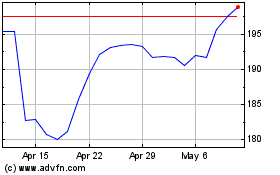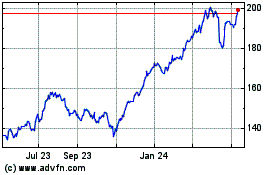By Justin Baer and Christina Rexrode
James Dimon's message to the markets: If no one else wants to
buy bank stocks, I will.
J.P. Morgan Chase & Co.'s chairman and chief executive on
Thursday bought 500,000 of his firm's shares, according to a
regulatory filing, trying to deliver a jolt of confidence to
investors as a monthlong slide in bank stocks threatened to become
an avalanche.
J.P. Morgan shares fell 4.4% on Thursday, then jumped after The
Wall Street Journal reported Mr. Dimon's purchase after the close
of trading. Mr. Dimon paid about $26.6 million for the shares, at
prices ranging from $53.14 to $53.30 each.
Shares in the nation's biggest bank by assets have dropped
nearly 20% this year, and some of its peers have seen even bigger
declines. Bank of America Corp., for example, tumbled 6.8% on
Thursday, its biggest one-day slide in more than three years. In
the first six weeks of this year, the Charlotte, N.C., bank has
given up nearly three years of gains, falling 34%.
Bank shares overall have been among the worst performers in
2016, their declines about twice as steep as those of the Dow Jones
Industrial Average and S&P 500.
Investors are fretting over slowing economic growth, falling
energy prices and the possibility that interest rates will drop
further. All of the factors are expected to take their toll on bank
earnings.
Meanwhile, bank executives have projected an aura of serenity,
blaming outside forces and working to control what they can. On
fourth-quarter earnings calls in January and at a Credit Suisse
forum in Miami this week, they reminded investors that markets can
be irrational--and that they are well capitalized enough to be in
good shape to handle a slowdown.
Mr. Dimon's move, though, is arguably the biggest statement yet
from a bank executive that the selloff is overdone.
"Jamie Dimon stepped up to the plate," said Mike Mayo, an
analyst with CLSA. "It's a big number. It's either a financial
catastrophe, or this is an epic buying opportunity."
During the selloff, few other bank executives have bought shares
of their firms. Citigroup CEO Michael Corbat and Chairman Michael
O'Neill are exceptions, each buying 25,000 Citigroup shares in
January, at about $41 a share, according to regulatory filings, at
a cost of about $1 million each. Citigroup Chief Financial Officer
John Gerspach bought about $500,000 worth of Citigroup shares this
week, the bank disclosed Thursday.
A Citigroup spokesman said the actions speak for themselves. The
bank's shares are down 32% this year.
Analysts on Thursday again struggled to explain the sharp drop
in bank shares, given that the firms are far better capitalized
than they were when they entered the financial crisis, with
regulators forcing them to hold more cash and get rid of some of
their riskier businesses. U.S. banks also don't face many of the
structural problems that are evident in their European peers.
"Sometimes the market just panics," said David Hilder, an
analyst at Drexel Hamilton.
Stock prices are still far above their lows of previous panics,
including the financial crisis of 2008-2009 and the 2011 eurozone
panic. Credit-default swaps, which work like insurance policies
when companies default on bonds and loans, have spiked this year
but aren't close to the highs of 2011.
One other difference compared to years past isn't so positive
for the banks: Middle Eastern sovereign-wealth funds, which propped
up flailing banks with big investments during the financial crisis,
aren't in a position to be saviors again. Plunging oil prices have
strapped their largess.
Charles Peabody, an analyst at Portales Partners, attributes
some of the recent drop in bank stocks to sovereign wealth- funds
selling off their shares.
"It has nothing to do with the fundamentals of the banks," Mr.
Peabody said of Thursday's decline.
The plunge in bank stocks comes at a bad time of year for
bankers and traders: Some stock awards they received in the past
few years, which are now vesting, will be worth far less than when
they were issued.
Mr. Mayo said he met with Mr. Dimon along with some other
investors at J.P. Morgan's headquarters in midtown Manhattan
earlier this week, and the CEO seemed "extremely relaxed."
The bank CEO assured his visitors that the economy was fine,
consumers were still strong and activity levels were still good,
Mr. Mayo said. When Mr. Mayo asked Mr. Dimon if he was planning to
buy J.P. Morgan stock, the CEO didn't tip his hand but called the
selloff a "financial market event that's not likely to impact the
real economy," Mr. Mayo said.
Including Mr. Dimon's purchase on Thursday, his J.P. Morgan
holdings are worth $357.7 million.
Mr. Dimon's purchase might be big enough to soothe market's
jangled nerves, said Mr. Mayo, adding that "bank stock investors
are shell-shocked right now."
(END) Dow Jones Newswires
February 11, 2016 19:38 ET (00:38 GMT)
Copyright (c) 2016 Dow Jones & Company, Inc.
JP Morgan Chase (NYSE:JPM)
Historical Stock Chart
From Mar 2024 to Apr 2024

JP Morgan Chase (NYSE:JPM)
Historical Stock Chart
From Apr 2023 to Apr 2024
